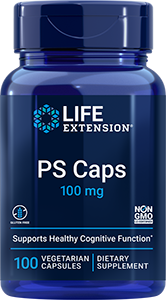
Phosphatidylserine Benefits for Brain Health
Published: July 2024
The brain is always working, and just like the rest of the body, it needs proper care and nourishment. Enter phosphatidylserine, a unique fatty substance found naturally in your body that's a key player in the realm of brain health.
Phosphatidylserine benefits your brain function in a number of ways, thanks to its role in supporting cell structure and cell communication. But like so many things, our levels naturally decline with age.
Let's explore how adding phosphatidylserine to your wellness routine may help support your brain and keep your mind in tip-top shape.
What is phosphatidylserine good for?
You might not have heard of phosphatidylserine, but this unsung hero is found in every cell of your body. It plays a crucial role in keeping your brain healthy and your memory sharp. Phosphatidylserine is a special type of fat called a phospholipid. As such, it is an important building block for the outer barrier of cells, or cell membranes, giving them structure and flexibility. These protective barriers surround each cell in our body, allowing essential nutrients in while keeping harmful substances out.
Phosphatidylserine is especially important in the brain. It not only helps brain cells maintain their structure, but it also supports their function, helping cells communicate with each other. This is essential for thinking, memory and overall brain health.
In the body, phosphatidylserine benefits brain health in several ways:
Neuron helpers:
Phosphatidylserine helps build and maintain the cells in your brain and nerves (neurons) that are essential for sending and receiving messages. It also helps neurotransmitters, the chemical messengers in our brain, to do their job, allowing them to communicate more effectively.Supports cognitive function:
Phosphatidylserine helps to support memory and learning, boost your focus and concentration, sharpen your memory and encourage overall cognition.Protects against the effects of aging:
Phosphatidylserine levels naturally decrease as we get older. Food and nutritional supplements may help with this and help fight age-related cognitive decline, supporting brain health in older adults.Supports a healthy inflammatory response:
Phosphatidylserine helps inhibit inflammation to support brain and nervous system health.
Does phosphatidylserine help with brain fog?
Have you ever had moments when you felt mentally drained and struggled to focus? This is known as brain fog. This occasional mental fatigue and inattentiveness can affect your ability to think clearly, stay organized and articulate your thoughts.
Phosphatidylserine crosses the blood-brain barrier to support brain function, and the effects of phosphatidylserine include fighting brain fog and supporting memory, focus and attention. In a six-month clinical study, phosphatidylserine significantly supported memory function compared with placebo.
Cell Membranes: How Do They Work?
As we've mentioned, PS is a phospholipid. So what is that, and what does it have to do with your brain cells? Let's get into the anatomy of a phospholipid to explain.
Phospholipids have two main parts:
- A head that's composed of a phosphate group. This part loves water (hydrophilic).
- A tail that's composed of fatty acids. This part hates water (hydrophobic).
When you put phospholipids in water (which is in ample supply in our bodies) they arrange themselves in a double layer with the heads facing the water and the tails on the inside, hiding from the water. This arrangement forms the cell membrane.
Maintaining healthy levels of phosphatidylserine through supplementation is a proactive measure to help keep cells healthy into ripe old age.
How do I get more phosphatidylserine?
Your body already produces phosphatidylserine, and we get it from our diet as well. Some common food sources are soybeans, white beans, fatty fish (like tuna and mackerel), eggs, and organ meat (like chicken and beef liver).
A convenient way to enjoy the effects of phosphatidylserine is by taking a nutritional supplement. Phosphatidylserine supplements are typically made from plant sources such as soybean lecithin and sunflower lecithin. They may contain isolated phosphatidylserine, or they may be combined with other compounds that are beneficial for brain health, such as blueberry extract and ashwagandha.
Can I take phosphatidylserine supplements every day?
Yes. PS supplements should be taken every day according to the dosage on the label. As with any supplement, adhering to the dosage on the label is important, as this is based on scientific studies of phosphatidylserine benefits.
Be sure to consult with your healthcare provider before starting a nutritional supplement because of the effects of phosphatidylserine on prescription medications. Your provider can also discuss dosage considerations.
Should phosphatidylserine be taken at night or in the morning?
In general, follow the dosage instructions on the label when taking nutritional supplements. PS supplements can be taken any time of day, so you can take it when it is most convenient for you. The best time to take it will vary based on your individual needs and lifestyle.
That being said, taking phosphatidylserine in the morning may help improve cognitive function, attention and focus throughout the day. This can be especially beneficial if you want to support your mental clarity and concentration throughout the morning and afternoon hours.
Explore Our Best Brain Health Supplements
6 ways to support brain health
Maintaining brain health is essential for long-term cognitive function and overall well-being, especially as you age. Besides diet and nutrition, you can help keep your mind sharp with some healthy brain habits. Incorporating these habits into your daily routine can help keep your brain healthy and functioning its best:
Stay mentally active:
Engage your brain with new learning opportunities, puzzles, games like crosswords and sudoku, and fun brain teasers. These activities challenge your mind and help maintain mental sharpness. Additionally, games played in a group include a healthy social aspect that supports brain and memory health.Manage stress:
Feeling overwhelmed by your to-do list? Stress can significantly impact your focus and attention. By managing stress effectively, you can maintain better concentration and keep your mind on track. Stress management techniques and mindfulness meditation have been shown to improve cognitive functioning. Practicing relaxation methods can support healthy stress management and boost mental clarity.Exercise regularly:
Exercise benefits both your body and your brain. Research indicates that regular exercise can enhance overall brain function. Regular exercise also helps support stress management and already-healthy cortisol levels. If you're not much into athletic performance and want low-key exercise, try yoga, which combines gentle stretching with relaxation techniques. Yoga is also a great way to relieve occasional muscle soreness after exercise. (On the other hand, if you do improve your athletic performance from your workouts, that has additional benefits to boot!)
Prioritize sleep:
Getting good sleep is essential for keeping your brain healthy. Quality sleep also supports a healthy mood, memory, weight management, immune system response, social skills, mental health and stress management. Aim for 7-9 hours of quality sleep per night to help your brain and body recharge and function at their best.Eat nutritious meals:
A balanced diet rich in nutrients is vital for brain health and healthy cortisol levels. The MIND diet specifically focuses on combating age-related cognitive decline by emphasizing green leafy vegetables, omega-3 fatty acids, berries, nuts, legumes and other brain-friendly foods.Stay hydrated:
Water is essential for life and brain health. Water helps the brain get the oxygen and nutrients it needs for optimal mental function. Be sure to drink plenty of water daily to help you stay focused and on task.
Looking to keep your mind sharp with nutritional supplements? Our health needs quiz can get you started with recommendations tailored to your lifestyle.
References
- Dai Y, et al. "The Crucial Roles of Phospholipids in Aging and Lifespan Regulation." Front Physiol. November 2021. https://pubmed.ncbi.nlm.nih.gov/34887779/
- Glade MJ, Smith K. "Phosphatidylserine and the human brain." Nutrition. June 2015. https://pubmed.ncbi.nlm.nih.gov/25933483/
- Jamil A, et al. "Meditation and Its Mental and Physical Health Benefits in 2023." Cureus. June 2023. https://pubmed.ncbi.nlm.nih.gov/37476142/
- Kato-Kataoka A, et al. "Soybean-derived phosphatidylserine improves memory function of the elderly Japanese subjects with memory complaints." J Clin Biochem Nutr. November 2010. https://pubmed.ncbi.nlm.nih.gov/21103034/
- Kim HY, et al. "Phosphatidylserine in the brain: metabolism and function." Prog Lipid Res. October 2014. https://pubmed.ncbi.nlm.nih.gov/24992464/
- Ma X, et al. "Phosphatidylserine, inflammation, and central nervous system diseases." Front Aging Neurosci. August 2022. https://pubmed.ncbi.nlm.nih.gov/35992593/
- Morris MC, et al. "MIND diet slows cognitive decline with aging." Alzheimers Dement. September 2015. https://pubmed.ncbi.nlm.nih.gov/26086182/
- Northey JM, et al. "Exercise interventions for cognitive function in adults older than 50: a systematic review with meta-analysis." Br J Sports Med. February 2018. https://pubmed.ncbi.nlm.nih.gov/28438770/
- Wang B, Tontonoz P. "Phospholipid Remodeling in Physiology and Disease." Annu Rev Physiol. February 2019. https://pubmed.ncbi.nlm.nih.gov/30379616/
- "Brain Basics: Understanding Sleep." National Institute of Neurological Disorders and Stroke. https://www.ninds.nih.gov/health-information/public-education/brain-basics/brain-basics-understanding-sleep
Like what you read?
Please subscribe to get email updates on this blog.









